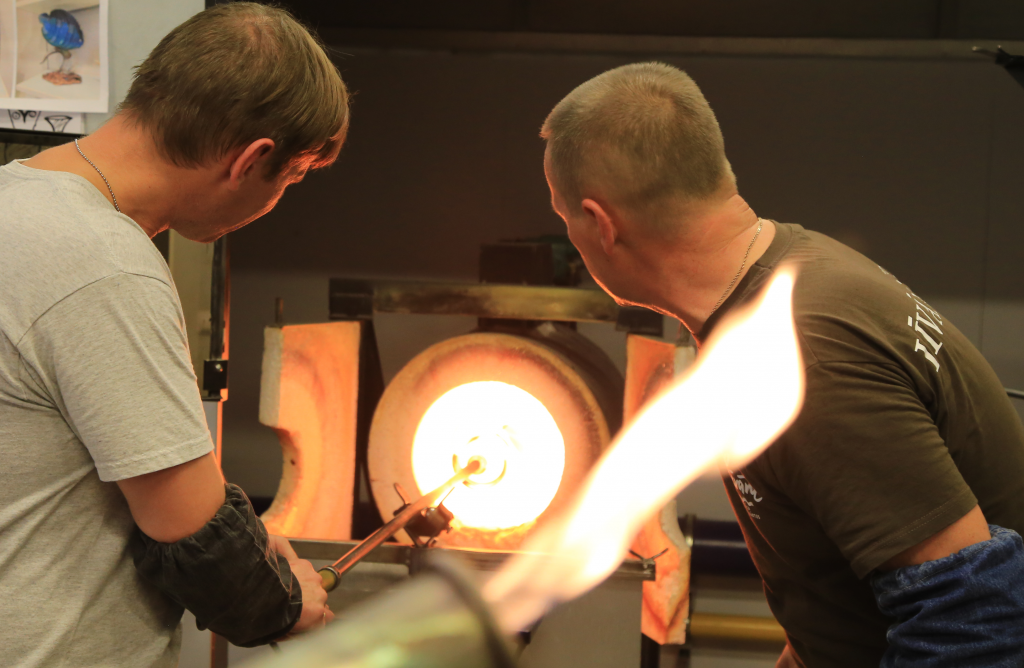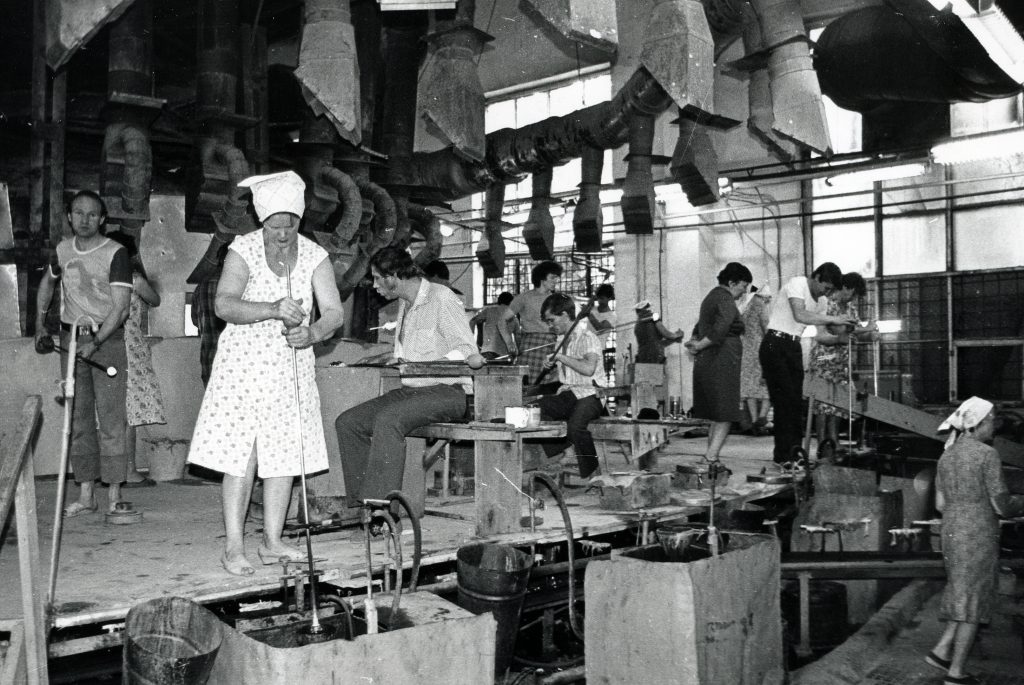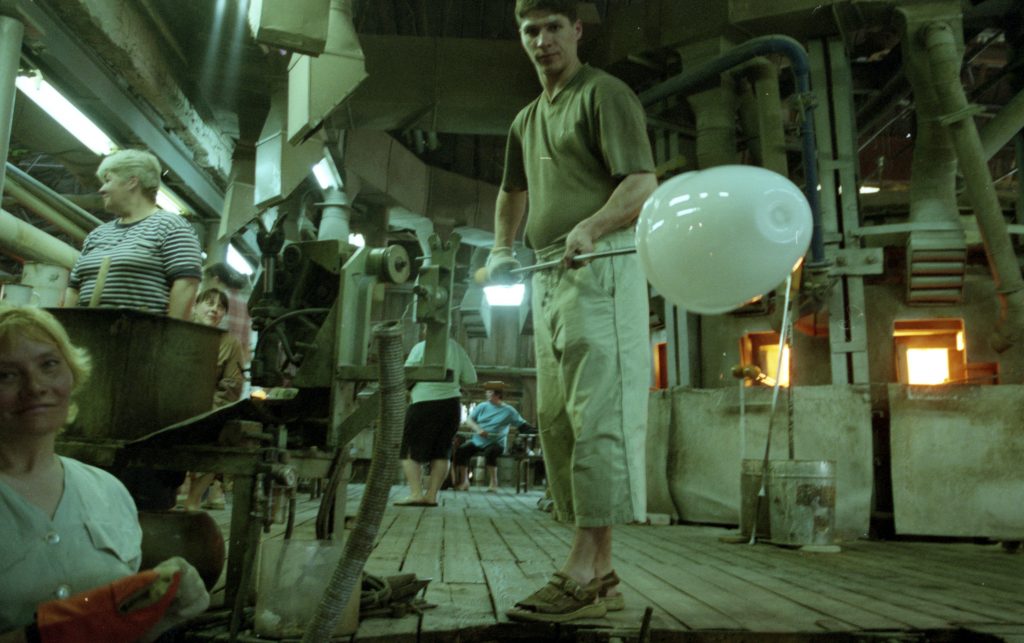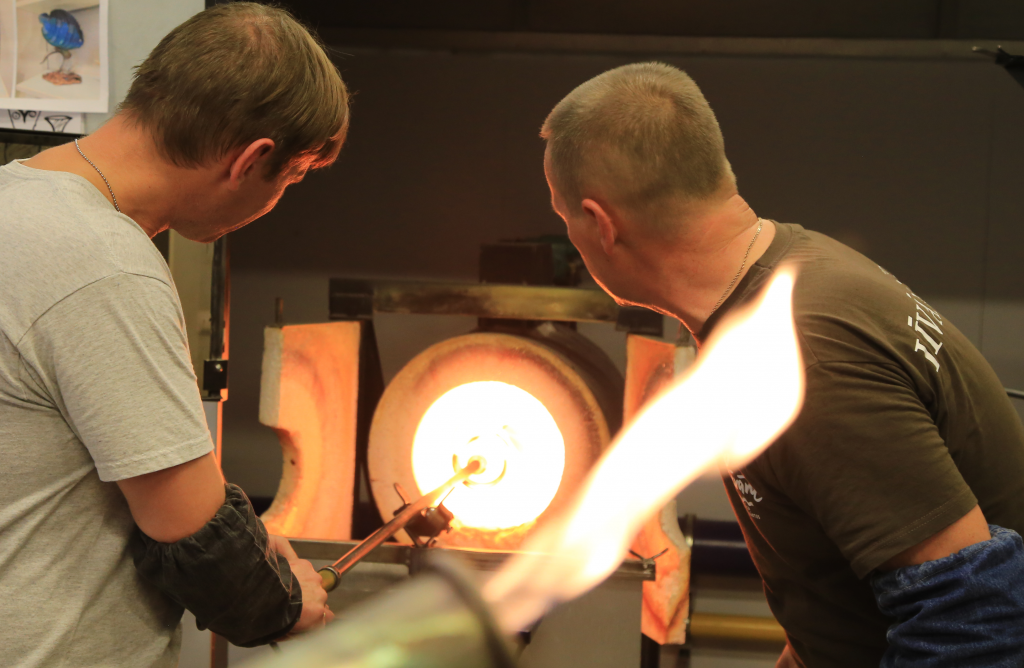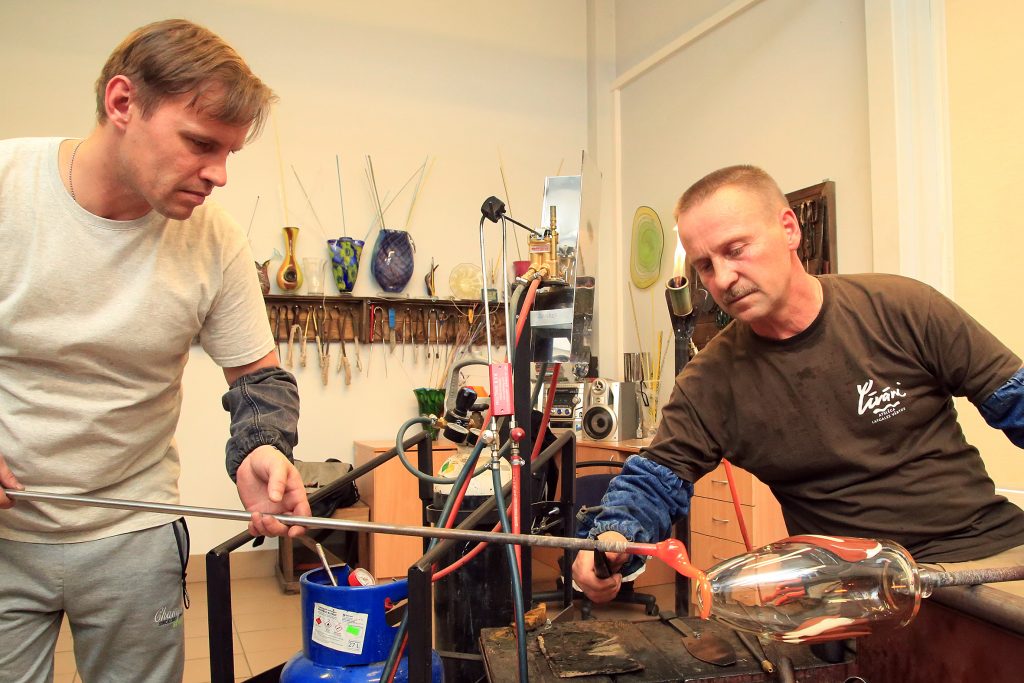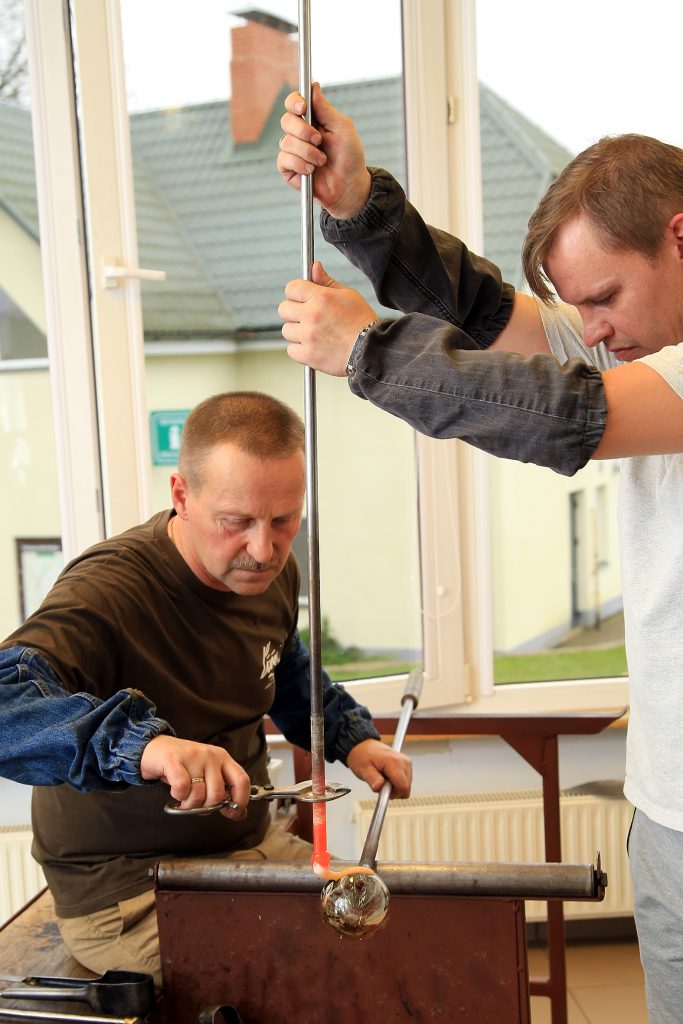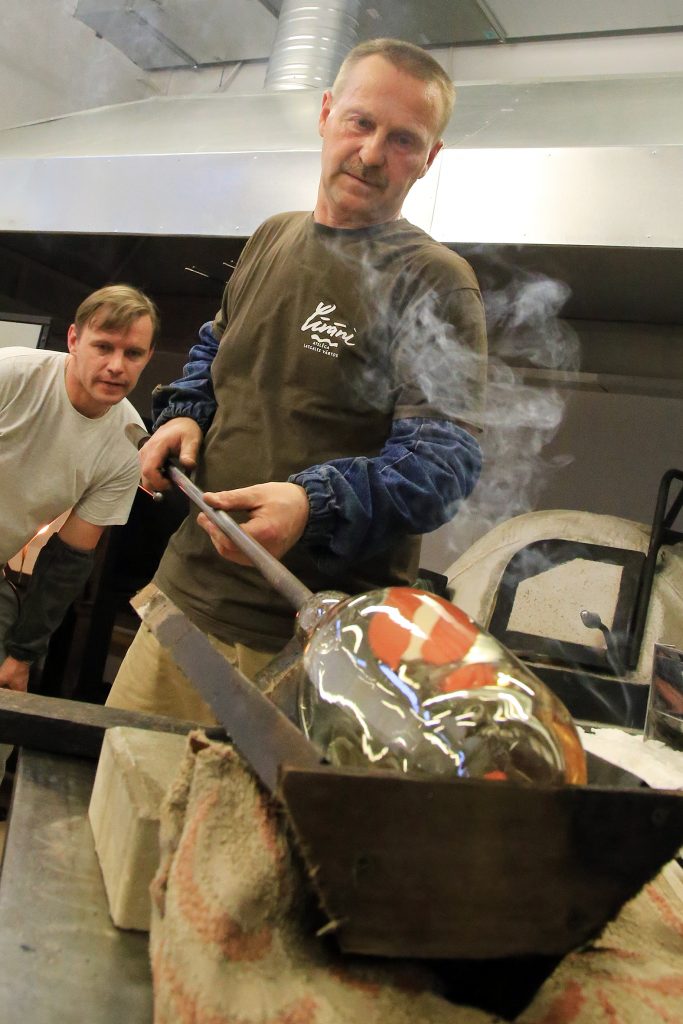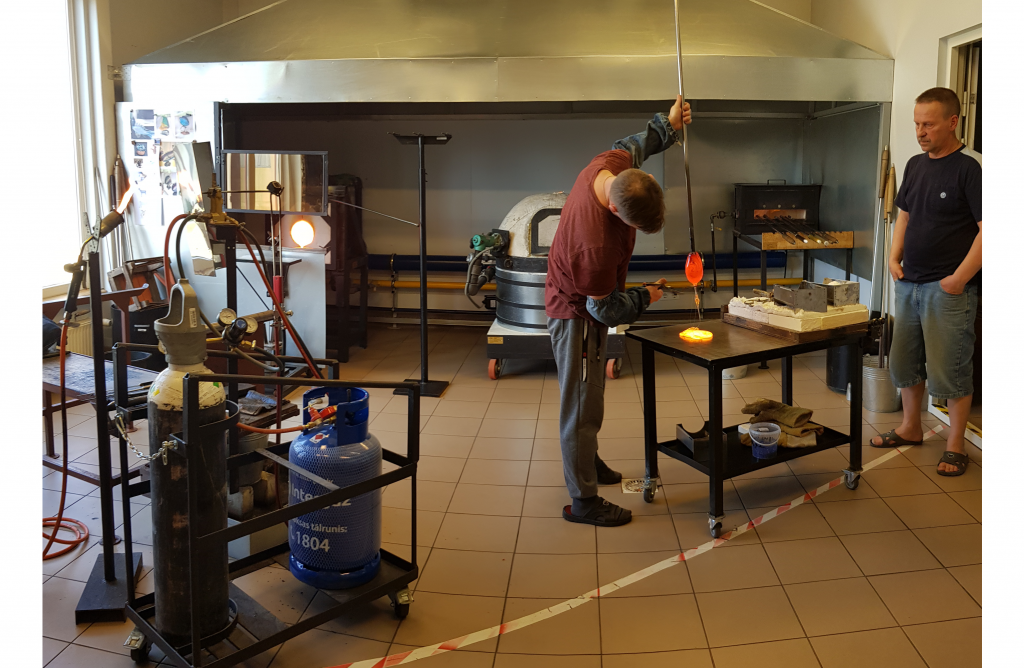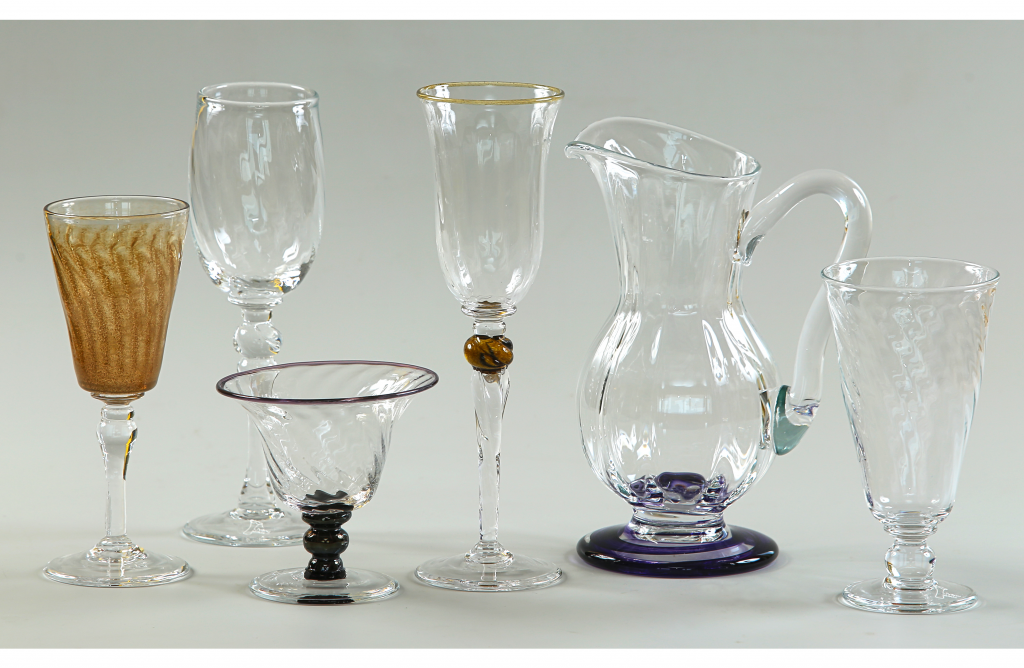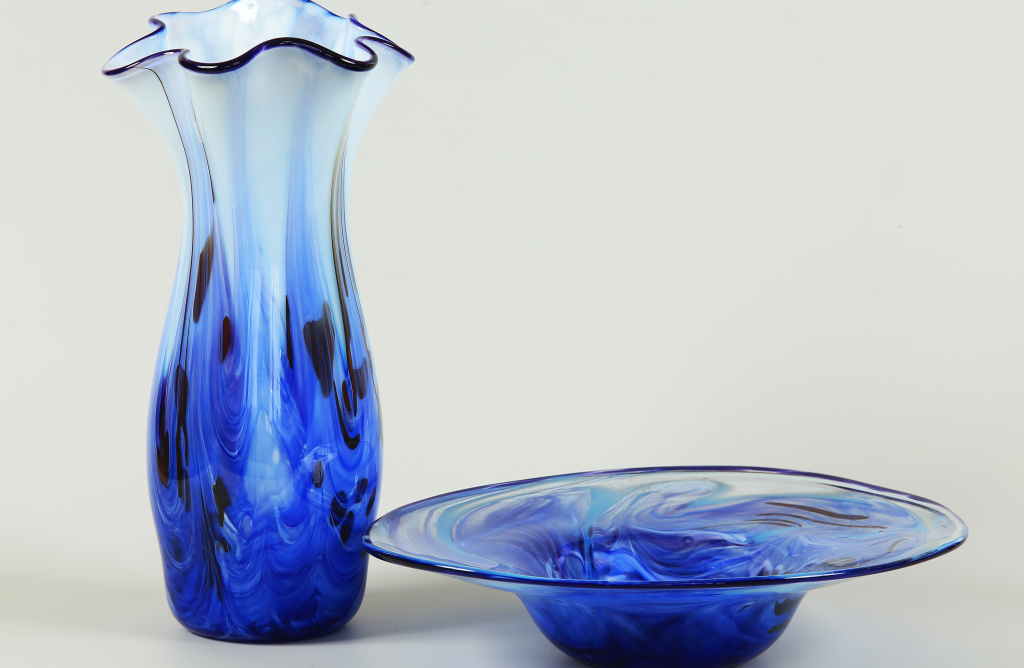Author:
Ilze Griezāne
Traditional craft skills
Title
Glassblowing Craft Skills in Līvāni (2020)
Geography
Līvāni. There is a great deal of truth to the adage that “In reality, all glassblowers come from Līvāni”. The glassblowing technique was used to produce glassware in Līvāni since the late 19th century. Even as times changed, the Līvāni Glassblowers have always wanted glass to continue living through active glass production, and for glassblowing traditions to be maintained and passed on to new apprentices. The glassblowers of Līvāni hold knowledge of ancient glassblowing traditions and trade secrets handed down from generation to generation of working at hot glass furnaces to shape the highest quality glassware. There are no families here without a story about glass and the Līvāni Glass factory, because almost everyone has a family member who’s worked in the former factory. “Lettglass”, the original Līvāni Glass factory, closed its doors in 2008. Many glassblowers now work in other sectors and only a few have sought out ways to continue this ancient trade by finding work in other glassblowing workshops in Latvia or abroad. Since the glass factory closure, everyone in Līvāni has lived with the hope that glassblowing would rise again to continue the tradition that has lasted for over a century and is a hallmark of this town. Thanks to the initiative and passion of Aleksandrs Košeļevs, the Līvāni Municipality Council made this hope a reality by founding a glassblowing workshop in the Latgale Art and Craft Centre to preserve the glassblowing tradition and provide for the transmission and development of this skill. Glass continues living in Līvāni. Two glassblowers are employed in the workshop, producing glassware from hot glass and, in the process, keeping the glassblowing tradition alive.
Līvāni Municipality preserves this tradition of glassblowing and provides ongoing funding to the glassblowing workshop, while also supporting related activities that nurture glassblowing skills.
The skills associated with this trade are a hallmark of Līvāni and of singular cultural importance to the entire country of Latvia.
The workshop currently employs two glassblowers – Aleksandrs Logvins and Valērijs Veiss. Old-time employees of the Līvāni Glass Factory appreciate that this tradition has been reborn in Līvāni and now have the opportunity to drop in, reminisce about the old days, and share their glassblowing experience. The people of Līvāni understand and treasure the skill glassblowing requires, and they are proud to show the glassblowing process to their guests. Collaboration is also underway with the Art Academy of Latvia and glass artists from other countries.
Importance in Community Life
For this community, the glassblowing tradition means belonging to a small, unique niche craft in Latvia and the world. The desire to preserve the glassblowing tradition unites members across multiple generations. A variety of events are held to allow the community to meet and share memories and experiences.
These activities promote the preservation of this tradition, while also contributing to the development of local tourism, as well as instills a sense of belonging and patriotism in the people of Līvāni.
The Municipality was able to preserve the Līvāni Glass Museum exhibition, which presents the story of glassblowing, giving the community confidence that their historical heritage is safe and being developed, as well as promoted.
Activities
Glassblowing can’t be just a job; it must be a passion. Working with hot masses of glass (at around 1,400°C) demands not only endurance, but also immeasurable patience and mastery.
Glassblowing, like other trades, has its own particular rituals. For glassblowers, it is a dialogue between their souls and the glass. When you watch glassblowers at work, you can see how they use their movements to speak with their creations, directing their thoughts toward the expected outcome.
In the beginning, as you watch the process, it is difficult to tell what will emerge from this hot mass of glass – will it be a vase, a fruit bowl or a light fixture?
Glassware production begins when a hot mass of glass is gathered up with the glassblower’s blow pipe. It is followed by a process where the glassblower steadily blows air into the hot mass, giving it shape with the help of several tools.
The creation of every work of art is a singular performance. To observers, the process is enthralling and interesting. Few can appreciate the glassblower’s ability to sense the hot glass and control its might. To learn this art, glassblowers must have not only practical experience, but must also understand the technical specifications of glass furnaces and the physical and chemical properties of glass.
The production of glass requires working in pairs. The presence of the assistant allows the glassblower to create more complex glass structures, which is why teamwork is a feature of this profession.
It is important for glassblowers to work in an artistically organized workshop. With great attention to detail, the glassblowers have created a fascinating environment for visitors. The displays of tools and materials invite visitors to touch and experience some of the uniqueness of this profession.
Inheritance and transmission
Glassblowing is not taught in any of Latvia’s technical schools, nor are there any glass factories. For this reason, the preservation of this craft depends on the direct transmission of skills and learning practical skills from a master artisan. Theoretical knowledge is also necessary, which can be acquired by reading specialized literature.
History
The first glass factory was built in Līvāni in the late 19th century in response to favourable economic, production and raw material extraction conditions.
Before World War I, the Līvāni Glass Factory was the largest in Latvia, with about 500 employees. The factory was destroyed during the war, but in the 1920s, Latvijas stikls [Latvian glass] renewed production. However, it didn’t bring in the expected profit and soon declared bankruptcy.
In 1944, a group of experienced glassblowers gathered in Līvāni wishing to restart glass production to provide employment for workers and renew the glass manufacturing sector that had been the pride and joy of Līvāni before World War I.
The glassblowers of that time, average people with excellent skills, were present at the beginning of this revival of Līvāni Glass. Young glassblowers received instruction from the old masters.
Early in the 1960s, the Līvāni Glass Factory began to take on the shape of a large, modern glass manufacturing facility.
Automation was introduced and, as production increased, the artisans’ glassblowing skills also grew. The 1970s were marked by the addition of coloured glassware.
In the 1980s, one of the factory’s most significant achievements was the production of colourless crystal glassware.
To convert designer ideas into glass, glassblowers had to be able to do very fine and creative work. In the 1980s, the company experienced a boom and a period of stable growth.
During this period, the young glassblowers were trained by 50 highly trained specialists. The work created collaboratively by artists and high-level glassblowers facilitated the recognition of the glass produced in Līvāni.
The factory was privatized in the early 1990s and became “Līvānu stikls” [Līvāni Glass]. Although production volumes decreased with glassblowers working only on branded glassware, the factory remained at its former size.
In 2001, as cooperation developed with German firms, the factory became a German company known as “Lettglass”. During this period, new production lines were developed, and the remaining glassblowers adapted to new technologies. Production was, however, not successful and the factory ceased operations in 2008.
Although they have survived different times and conditions, glass production and glassblowing traditions in Līvāni have always recovered.
There has been a glass blowing workshop at the Līvāni Municipality Latgale Art and Craft Centre since 2016, and glass is once again being blown.
As more attention is given to preserve the craft, people are increasingly coming to value handcrafted work, and not only the finished objects, but also the process whereby they are created.
At the Līvāni Glassblowing Workshop today, people watch the artisans engaged in glassblowing with great interest. As they see the work and mastery that is involved, their understanding of the value of glasswork and the uniqueness of the profession changes.
The rebirth of glassblowing in Līvāni is also appreciated by the glass artist Juris Dunovskis (of the Studio Dunovglass) with whom there have been several successful collaborative projects.
Since glass is becoming an important element of today's contemporary design, many glass artists, as well as students and instructors at the Glass Department of the Art Academy of Latvia, carry out their ideas in the glassblowing workshop.
This experience is valuable to both parties, giving the glassblowers an opportunity to experiment in collaboration with glass artists to create glass artwork they ordinarily wouldn’t create.
Additional Information
Glassblowing traditions also involve oral traditions which have taken shape and developed alongside the craft of glassblowing.
A small lexicon has been compiled of words commonly associated with the glassblowing trade and glass production.
The dictionary was developed by consulting the available documentation and interviewing former glassblowers in Līvāni.
The oral tradition is a separate subject that requires further research.
Masters
The individuals working at the Glassblowing Workshop of the Latgale Art and Craft Centre are the only practicing glassblowers in Latvia (master Aleksandrs Logvins and his assistant Valērijs Veiss).
Aleksandrs Logvins has 36 years of experience in this profession.
Valērijs Veiss is both a glassblowing assistant and an apprentice.
Juris Dunovskis from Jurmala and the glass artist Anda Munkevica also hold knowledge of the craft and glassblowing traditions, as do other former glassblowers from Līvāni, Grīziņkalns, and Iļģuciems glass factories, but no longer practice the craft.
Institutions and Organizations
Līvāni Municipality
Līvāni Glass and Craft Centre
SIA CeramOptec
Fellowship "Sarkanais akmens" (Red Stone)
Strengthening the Tradition
One of the first steps taken toward increasing appreciation of the glassblowing tradition was preserving the Līvāni Glass Museum collection after the firm’s bankruptcy and installing the Līvāni Glass Museum exhibit at the Latgale Art and Craft Centre in 2013.
To provide for the preservation of the glassblowing tradition, in 2016 the Līvāni Municipality established the Glassblowing Workshop. The workshop was equipped with all the necessary equipment including a crucible for melting glass, an annealing furnace, specialized tools (blow pipes, tongs, shears, clamps), a special glassblower’s workbench, and raw materials for glassblowing. A glassblower and glassblowing assistant are employed at the workshop.
The glass blower has the opportunity to work, develop blowing skills, train a glassblowing assistant, and transfer his master's knowledge in an orderly working environment. The glass blowing workshop can be visited by the general public (tourists, pupils, etc.). The Latgale Arts and Crafts Centre is visited by an average of 10,000 visitors a year. Visitors can see how hot glass mass is used to create glass products, and learn about the work of a glassblower. The opportunity to watch the glassblower work in person has also contributed to an increase in tourists in Līvāni. Visitors to the Latgale Arts and Crafts Centre have increased by about 1,500 visitors a year. The glassblowing workshop has been working for five years, during which cooperation has developed with the lecturers of the Latvian Academy of Art's Glass Cathedral (Vineta Groza, Ilze Dūdiņa, Inita Ēmane), as well as with the owner of GLASSPOINT studios, glass artist Anna Varnasi. Glass products – dishes and souvenirs – made in a glassblowing workshop are available for purchase in the Latgale Art and Crafts Centre shop. At least two exhibitions are organised per year. One glassblowing workshop product exhibition and another glass artist exhibition. So far, several artists have had exhibitions – Juris Dunovskis, Mark Ekstrand, Ineta Pudža and LMA lecturers and students in cooperation with the studio Glasstone.
Several grant applications have been prepared to support the development of glassblowing trade traditions.
1. Late in 2015, a pamphlet of stories told by glassblowers was published through the “Dzīvais stikls” [Living Glass] project, funded by the State Culture Capital Foundation.
2. In 2016, a fully equipped glassblowing workshop was set up with financial support from the Līvāni Municipality and the State Culture Capital Foundation. Glassblower Aleksandrs Logvins was hired for this position.
3. In 2018, a successful application was made to the Latvia-Lithuania-Belarus “Cross-Border Cooperation Programme for 2014-2020”, for The Preservation of Glass Making Traditions and Glass Craft Development project.
Implementing this project in 2021 is the most immediate challenge for the Latgale Art and Craft Centre, as they work to develop and preserve the glassblowing tradition.
The goal of the project is to preserve the disappearing historical heritage of the glassblowing trade and to promote valuable glassblowing skills, increase the visibility of the glassblowing trade among youth, and engage in exchange experiences with partners abroad.
The activities planned in the project include training for interested parties in glassblowing, training apprentice glassblowers in glass grinding and engraving, experience exchange trips, master classes for glassblowers and glass designers, thematic and educational conferences and seminars, and glass art symposiums.
The project also includes advertising for events, purchase of workshop equipment, and publication of symposium catalogs.
At this time, the glassblowing workshop is funded entirely by the Līvāni Municipality.
In 2019, expenditures for the workshop amounted to €62,684. In addition to the funding provided by the municipality, additional funding is being sought through several programmes.
A plan for the next 5 years has been developed – "Glass Blowing Workshop Sustainability Assurance Plan 2020-2025", which will ensure planned development of the workshop.
Continuity/Development
1. Work will continue developing and cataloging the Līvāni Glass Museum exhibition, along with making new acquisitions and supporting research.
2. To boost visibility, a logo was developed for Līvāni Glass. This logo is applied to objects available for sale at the Latgale Art and Craft Centre souvenir shop.
Guests are welcomed into the workshop for glassblowing demonstrations. In 2018, the Glassblowing Workshop received the Latvian Heritage designation, which is extended to tourist sites that celebrate Latvian cultural heritage.
This designation tells visitors that these are places where artisans are prepared to offer demonstrations, talk about and teach their crafts.
3. The collaboration with the Glass Department of the Art Academy of Latvia increases the visibility of glassblowing traditions among glass artists and promotes interest in learning glassblowing traditions.
It is also possible to increase visibility abroad by hosting ERASMUS students.
In 2020, one student from the “Olustvere School of Service and Rural Economics in Estonia” studied the glassblower’s assistant trade under the direction of Aleksandrs Logvins.
4. There has also been cooperation with supermarkets that have hosted photo exhibits devoted to Līvāni Glass. There is a plan to cooperate with museums and other exhibition places in Latvia, hosting traveling exhibitions of Līvāni Glass.
Threats to the Tradition
1. Glassblowing technology is complex and expensive.
Making glassware requires setting up a glassblowing workshop.
Planning must include provisions for the availability of energy resources (gas, electricity) that fuel the crucible, the blowpipe heating furnace, the glass heating furnace, as well as the annealer.
There are very few specialists skilled in installing and servicing these furnaces. Glassblowing equipment is very specialized and, therefore, expensive. The workshop requires tools and raw materials that must be purchased from abroad.
2. There are very few individuals with knowledge of the craft.
Two of them are currently employed in Līvāni.
These glassblowers need apprentices to ensure continuity of the glassblowing tradition.
There are no schools or programs in Latvia that offer such instruction.
The glassblowing craft can only be learned from the working artisans in Līvāni.
There is a plan to develop a training program in collaboration with an educational institution.
Apprentices must be interested in learning this age-old craft. The “Olustvere School of Service and Rural Economics” in Estonia offers an introductory course but employment opportunities are limited. The glassblowing profession demands ongoing study and development.
3. Loss of local government interest.
As the elected representatives to the Līvāni Municipality Council change, there is the risk that support for the glassblowing tradition could be lost. Funding from the county budget could decrease and threaten the continued existence of the tradition. To preserve the tradition, the glassblowing workshop could be rented out to glassblowers or other private individuals motivated to continue the craft, thus maintaining the glassblowing positions and continuing the tradition.
4. Working conditions and impact on health and worker safety.
A set of regulations has been developed that glassblowers must follow. Glassblowers must be appropriately dressed, take the necessary precautions while at work, and wear safety glasses and a visor. They must undergo annual medical examinations. Health and safety are the responsibility of the glassblowers themselves, which means that they must do their utmost to be careful and remain aware of their health conditions.
Applicant
Līvāni Glass and Craft Centre, Reg. No. 40900005397
Photo Gallery
Video Materials
Text Materials
Publications
Pintāns, P. (1980) Meistarības kāpieni. Riga: Liesma
Anspaks, A. (1983) Līvāni. Riga : Avots
Vilcāns P. (1987) Līvānu stikls pasaules ceļos. Livani
Latgale Art and Craft Centre (2015) Dzīvais stikls. Līvāni.
Websites
http://www.livanustikls.lv/par-mums/livanu-stikla-muzejs/ - A brief description of the history of the Līvāni Glass factory.
https://klasika.lsm.lv/lv/raksts/makslinieka-darbistaba/aleksandrs-logvins-pedejais-ikdiena-stradajosais-stikla-putejs-l.a75303/ - Text and audio interview with the glassblower A. Logvins. The glassblower speaks about how he learned the profession.
https://www.youtube.com/watch?v=YtKMbIWmdjY - Glassware traditions are reborn in Līvāni.
https://www.youtube.com/watch?v=Tb6793-SiRU - Glass product manufacture demonstration.
https://www.youtube.com/watch?v=dV2qwERpMZs - The opening of the glassblower’s A. Logins exhibition, 2018.
https://www.youtube.com/watch?v=a-1uxpxbNyE - Aleksandrs Logvins receives the cultural mark “Latvian Heritage”, the video shows the glassblower’s assistant/apprentice Valērijs Veiss.

